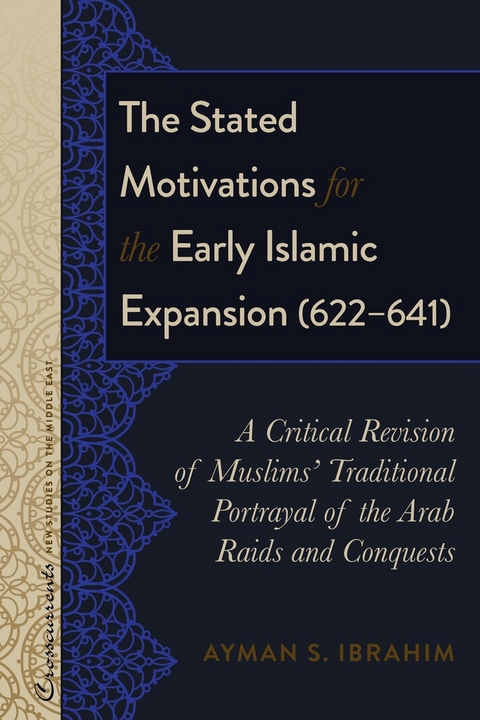
The Stated Motivations for the Early Islamic Expansion (622–641)
Peter Lang Publishing Inc (Verlag)
978-1-4331-3528-6 (ISBN)
What motivated the early Islamic conquests? Did the Arabs fight for Allah, or for wealth and dominance? Were the conquerors principally Arabs, or specifically Muslims? Were the Muslim believers motivated by religious zeal to proclaim Islam to the non-Muslims? Consequently, was Islam spread by the sword? This is a question that has crucial implications today.
The Stated Motivations for the Early Islamic Expansion (622–641) extensively analyzes the earliest Arabic Muslim sources to answer these and other questions. It relies on over 400 works, including primary sources written by more than 90 medieval Muslim authors, Sunni, Shiite, Sufi, and Mu’tazilite. It explores how medieval Muslim writers represented the early Arab leaders, and how much we can trust their reports. It concludes with an examination of the Qur’ān’s commands regarding fighting and armed jihad, and questions what later commentators suggest about fighting the non-Muslims, specifically how radical Muslim interpretations match or violate Islam’s sacred scripture.
This is the first scholarly analysis to focus on the stated motivations for the early Islamic expansion in the first two decades of Islam. It is a valuable resource for courses on Muslim history, introduction to Islam, Islamic origins and texts, classical and modern Islamic thought, Muhammad’s biography, Islamic Caliphates, Muslim-Christian relations, Jews in the Muslim world, Middle Eastern history, and world history. In the age of ISIS, Qaeda, and Boko Haram, this book reflects on how historiographical accounts can inform today’s multi-cultural and multi-religious societies on complex relations, mutual respect, and religious coexistence.
Ayman S. Ibrahim, Ph.D., was born and raised in Egypt. He has taught in various countries within the Muslim world, and in the West at undergraduate and graduate levels. He is currently working on his second Ph.D. in the Department of Middle Eastern History at the University of Haifa, Mount Carmel, and is examining conversion to Islam in the earliest Muslim period. In addition, he is Associate Professor of Islamic Studies at Southern Seminary and Director of the Jenkins Center for the Christian Understanding of Islam. His articles on Islam and Christian-Muslim relations have appeared in the Washington Post, Religion News Services, Colorado Springs Gazette, Louisville Courier-Journal, First Things, Faith Street, Charisma News, Evangelical Interfaith Dialogue Journal, Ethics Daily, among others.
System of Transliteration – Notes on the Text – Notes on the Text – Introduction – Review of Precedent Literature – Muhammad’s Maghāzī and Their Stated Motivations: A Critical Revision of Sīrat Rasūl Allāh – The Stated Motivations for the Early Futūḥ: From Maghāzī to Futūḥ Through the Ridda Wars: A Critical Revision – Jihad and Qitāl as the Qur’ān Sees Them: Exegeting Islam’s Scripture – Conclusion.
“At a time of increased conflict between Muslims and non-Muslims, many are seeking to build peaceful relations by noting traditional Muslim interpretations of the motivation for early Muslim conquests. By carefully analyzing and demonstrating that these interpretations often reflect later political and social contexts Ayman S. Ibrahim frees us to rely on the sacred texts directly to build a case for cordial religious coexistence.”—J. Dudley Woodberry, Dean Emeritus and Senior Professor of Islamic Studies, Fuller Graduate Schools
| Erscheinungsdatum | 15.01.2018 |
|---|---|
| Reihe/Serie | Crosscurrents: New Studies on the Middle East ; 3 |
| Mitarbeit |
Herausgeber (Serie): R. Kevin Lacey, Sari Nusseibeh |
| Verlagsort | New York |
| Sprache | englisch |
| Maße | 150 x 225 mm |
| Gewicht | 490 g |
| Themenwelt | Geisteswissenschaften ► Archäologie |
| Geisteswissenschaften ► Geschichte ► Allgemeines / Lexika | |
| Geisteswissenschaften ► Geschichte ► Regional- / Ländergeschichte | |
| Schlagworte | Arab • Ayman • Conquests • Critical • Early • Expansion • Farideh • Ibrahim • Islamic • Kamali • Kevin • Koohi • Lacey • motivations • Muslims’ • Nusseibeh • portrayal • Raids • Revision • Sari • Stated • Traditional |
| ISBN-10 | 1-4331-3528-0 / 1433135280 |
| ISBN-13 | 978-1-4331-3528-6 / 9781433135286 |
| Zustand | Neuware |
| Haben Sie eine Frage zum Produkt? |
aus dem Bereich


